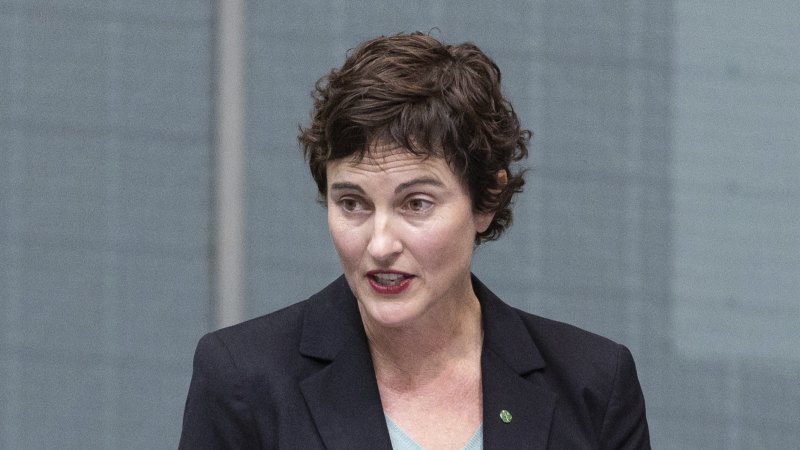Save articles for later
Add articles to your saved list and come back to them any time.
Independent MP Kate Chaney is warning that Labor’s plans to take money out of politics could kill off the so-called teal movement that dislodged half a dozen inner-city Liberals at the last election.
But in an interview, senior Labor minister Don Farrell shrugged off the teal movement’s concern that election spending rules will stymie community independents as he confirmed the federal government’s determination to reshape Australian democracy by cutting out US-style campaign spending.
Independent MP Kate Chaney is warning Labor’s campaign finance plans could kill off the so-called teal movement.Credit: Alex Ellinghausen
The Special Minister of State, who is responsible for electoral laws, went beyond his previous in-principle support for campaign finance reform to confirm he would seek to legislate a cap on political donations and seat-by-seat spending this year to have them in effect by the next election.
Chaney, who won the WA seat of Curtin previously held by former foreign minister Julie Bishop, said the financial curbs “could entrench the major parties and reduce competition in our political system”.
“At the last election, a third of Australians voted for minor parties or independents. People don’t want to see big money changing policy or election outcomes, but they also want to know they’ve got a choice of candidate and it’s expensive to get the message out,” Chaney said.
While the size of the caps are yet to be determined, Farrell argued laws to stop billionaire Clive Palmer spending $120 million on a single election were imperative and would also capture outfits like unions and GetUp.
“I’d hope to get consensus on that. I’m trying to be optimistic here [and] bring back a bill that has all of those things and has the support of the other parties,” he said.
“The intent is to improve transparency in the Australian political process, and as part of that exercise to ensure that ordinary Australians can continue to participate in the electoral process. And that can’t be determined by your wealth, but by your enthusiasm for Australian democracy.
“Let’s call a spade a spade. Clive Palmer obviously spent in total $123 million at the last election. Now on this occasion, he didn’t get the electoral result that he obviously wanted. But in the past, he has been successful.”
Campaign funding vehicle Climate 200 and progressive think tank the Australia Institute are also warning that caps on spending could stop new independent candidates raising enough money to unseat cashed-up sitting MPs.
Farrell said the election funder’s high-profile convenor, Simon Holmes a Court, expressed his worries “very strongly” in a meeting with Farrell last month. Farrell emphasises his focus was on making it easier for ordinary Australians, not millionaires, to be involved in politics.
“He’s entitled to have his view,” Farrell said. “I’ve got to balance out all of the interests here. And as I say, I don’t believe that Australians want a system where the only people who can get elected are people with big bank balances.”
“I’ve said I’ll talk to all the parties and that includes all of the teals and I welcome their contribution. But at the end of the day, my job is to increase that transparency, reduce the ability of wealthy people to buy electoral outcomes.”
Holmes a Court said Climate 200 had more than 11,000 donors who helped level the playing field against major parties.
“Over the electoral cycle, the taxpayer contributes hundreds of millions in benefits to MPs’ campaigns, but nothing to newcomers. Any reform needs to make the system fairer,” he said.
To soften the blow for independents, it would be open to Farrell to enact rules similar to those in NSW where independents are allowed to spend slightly more than candidates from a party.
The veteran senator for South Australia acknowledged there could be trickiness in drafting laws that did not cut off Labor’s link to the union movement.
“There is an issue about how the Labor Party deals with unions because the Labor Party is the creation of the union movement … We’ve got to work through how any changes to the system might affect the relationship,” he said.
Cut through the noise of federal politics with news, views and expert analysis from Jacqueline Maley. Subscribers can sign up to our weekly Inside Politics newsletter here.
Most Viewed in Politics
From our partners
Source: Read Full Article






